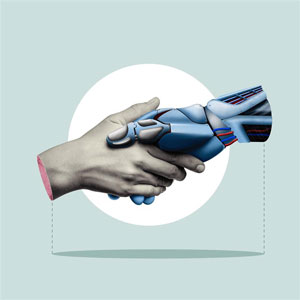
Photo: SvetaZi/iStock / Getty Images Plus/ getty images
We asked Pest Management Professional’s columnists and editorial advisory board members share about artificial intelligence (AI) in the pest control industry. Here are some of the experts’ responses from our August 2023 print edition.
Please take a minute to answer our latest one-question poll on this topic and let us what you’re bring to the new year: Reader poll: How do you think AI will affect — or is already affecting — the pest management industry?
PMP’s Editorial Advisory Board and Regular Contributors
Dennis Jenkins: “AI is already having an impact on routing. Route efficiency with AI will bring lower costs to the company and a higher earning potential to the field technicians. In addition, AI will affect our remote monitoring and be able to determine when action should be taken, saving time and materials. AI also may be used to allow customers to interact with it, so we can reduce office staff and become more profitable. All these changes will take time to affect profitability, of course, as the cost of AI in these roles is unknown. Initially, I would expect that the cost to implement AI would be higher, but over time will reduce operating costs.”

Foster Brusca
Foster Brusca: “AI is already assisting pest control business owners with their marketing. In the future, it will be used to help with pest identification, and building policies and procedures. It will be a be a great asset for pest control business owners; however, it must be continually managed and kept in check.”
Mark Sheperdigian: “AI has already begun to appear in urban pest management. It promises to replace human effort in the areas of monitoring, identification and client services, to name a few. The older generation will not develop a trust of AI outputs quickly, if at all. This will be the same innate distrust they have toward autonomous vehicles. Those who come to rely on its efficiencies are also likely to watch their own abilities atrophying to the point they cannot easily operate without it, much like drivers who have come to rely on GPS navigation for their vehicles.
Pete Schopen: “AI is already affecting our industry. I know pest pros who are using it for their websites, presentations, artwork and other things. In the near future, it will greatly reduce the need for customer service representatives (CSRs). But honestly? I hate it.”

Dr. Hamilton Allen
Dr. Hamilton Allen: “The number of possible applications is limitless, but let’s focus on pesticide manufacturing and training. AI currently may be in use to speed the insecticide active ingredient research, discovery and registration process. Pesticides will be safer for users and the environment without efficacy loss. On the technical training front, we’re currently identifying speech recognition and pattern technologies to produce technical content. Users can create scripts, and in turn have the scripts read in their voice through machine learning. We’re a long way from perfection, but the future is here.”
Dr. Faith Oi: “The short answer is that AI is already impacting the pest control industry. Within the University of Florida, we have guidance for authors when using AI tools: ICS.ifas.ufl.edu/media/icsifasufledu/docs/edis/EDIS-AI-Factsheet-v-1.pdf.”
Jerry Schappert, ACE: “It is most definitely going to be a benefit. For those who write blogs for their websites, AI can churn them out very quickly: You just have to review and edit, and then hit post. I for one will be using it.”

Michael Broder
Michael Broder: “AI has the ability to greatly help small to mid-size companies that have limited budgets for salaries and marketing. We all know the importance of getting information out on social media, but so many of us don’t know how to begin and what to say. AI can be very helpful in providing ideas on social media posts. I tested it out and it did a great job providing some great facts. AI also can be helpful with administrative tasks by helping provide job descriptions, forms and more. It will not replace our technicians, but it can be very helpful in the office.”
Paul Hardy: “Change has to come. If you are doing the same thing today that you were doing yesterday, then you are you are missing out on development leading to everyone’s betterment. Change is good; the world is waiting on us to reach our potential.”
Leave A Comment